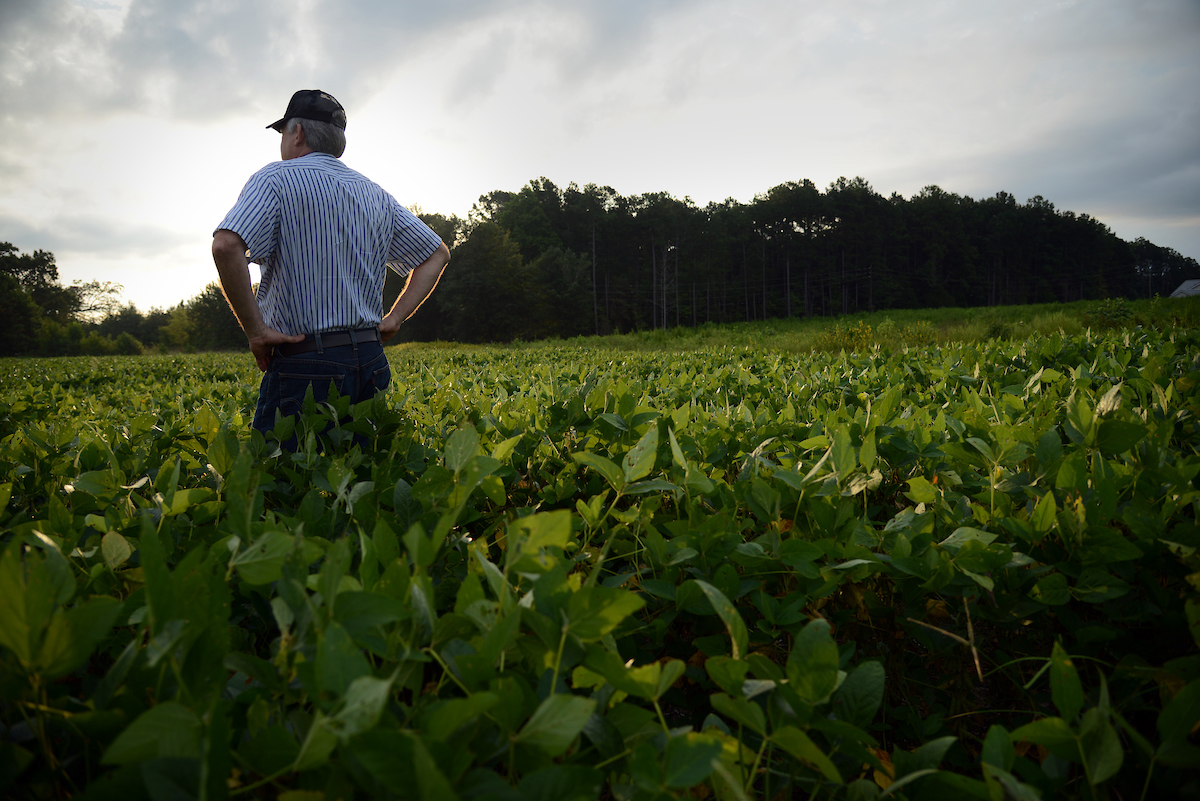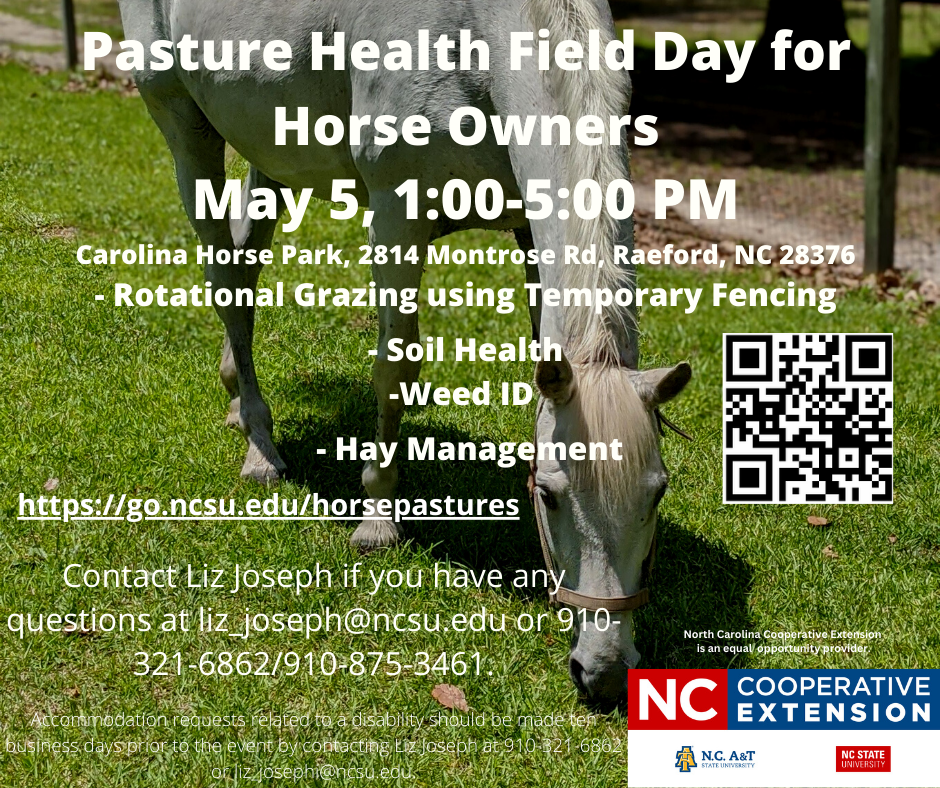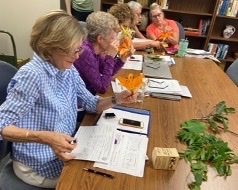|
|
|
|
|
|
|
|
|
|
Monthly Newsletter
February/Early March 2023
|
|
|
Extension programs and resources are available to all county residents. Feel free to forward our newsletters on to family and friends. Watch out for monthly announcements of events as this newsletter arrives in your inbox each month or keep up with us on Facebook or Instagram.
(If you do not wish to continue getting this newsletter you may unsubscribe at the link below.)
|
|
|
|
|
|
|
The Language of Flowers
Even though Valentine's Day has already passed, flower bouquets and flowered plants are popping up everywhere. Whether you want to show your love to someone special or you are just ready for spring, "Saying it with flowers," can get your point across. According to Melinda Knuth, of the Department of Horticultural Science at North Carolina State University, the language of flowers, or floriography, can be traced back to the Victorian era. During the reign of Queen Victoria, from 1837 to 1901, secret messages were sent in the form of floral arrangements.
A recent Extension article from the NCSU College of Agriculture and Life Sciences explains how you can express your sentiments by the kinds of flowers you give. To learn which flowers best convey your feelings, rather they represent eternal love, friendship or even jealousy, click and read A Petal for Your Thoughts.
|
|
|
AGRICULTURE AND THE ECONOMY
|
|
|

Have Your Experienced Sticker Shock at the Price of Eggs? Inflation Is Not Totally the Cause The United States Department of Agriculture
recently reported that the average price for a dozen large eggs currently in North Carolina is about $4.89, with the top of the range being around $5.97. Although inflation has certainly impacted this price, there is also an underlying factor contributing to this increase. When comparing USDA data from 2022 to 2021, it appears that nearly 10 million dozen eggs less were produced monthly in 2022 than 2021.
The culprit for lower egg production rates can be blamed on the Pathogenic Avian Influenza (HPAI) that was detected in domestic poultry in early 2022. As the name suggests, the disease is highly infectious, and sent shockwaves through the poultry industry. Infected flocks were depopulated to prevent spread of disease, which led to decreased egg production. When combined with a slightly increased demand for eggs by consumers, this
dip in production caused prices to surge. Unfortunately, consumers are now feeling the impact of HPAI at the grocery store. Much like COVID-19, HPAI is here to stay. However, the industry is adapting to this change, and fortunately, consumers will likely feel relief as egg production returns to pre-HPAI levels.
|
|
|
| MOORE COUNTY AGRICULTURE: SOIL SCIENCE
|
|
|
|
|
NC STATE EXTENSION: HOMEGROWN
|
|
|
|
|
Speaking of the Cost of Eggs...Though the cost of eggs has significantly gone up this past year, the average North Carolinian consumes more than 250 eggs each year. That's because there are a multitude of ways to enjoy the "incredible edible egg" other than just scrambled or sunny-side-up. Eggs are used in an array of recipes and cooking methods such as baking and even for brewing beer.
Beyond their everyday culinary uses, eggs are an essential part of North
Carolina agriculture. One might say poultry is the golden goose of the animal agriculture industry: 7th: Eggs’ rank in the state for total cash receipts among all agricultural
commodities
9th: North Carolina’s national rank for egg production
4 Billion: Number of eggs produced in North Carolina annually
Still, considering the price of a dozen eggs currently, you want to be sure you are getting good eggs. In this edition of Homegrown, find out how to determine the difference between a good egg and a bad egg.
|
|
|
|
|

The Farm Bill: What and Why It Matters
It is 2023 which means this is the year to reauthorize the US Farm Bill. But why does it matter? For almost 100 years, the Farm Bill has been used to track food production in the U.S. Congress studies the data the Farm Bill collects to pass legislation that meet the needs of farmers and consumers. Agriculture has a major role in national security by ensuring food is secure and accessible. The Farm Bill comes up for reauthorization every five years. Its five-year timeline gives legislators the opportunity to update agricultural programs so they correspond to current market and economic conditions. There have been 18 farm bills since the 1930s. Since the last farm bill was passed in 2018, this year’s approval will carry the Farm Bill to 2028. Because agriculture has to change and adapt to meet the demands of the day, the Farm Bill is updated to address the needs of an ever-changing world and to verify that vital programs continue to be relevant to the wellbeing of farmers and ranchers,
families, and rural communities. The Farm Bill is important and affects all Americans. It ensures a safe and abundant food supply, helps feed the hungry, invigorates rural communities and helps farmers take care of the environment as they continue to provide sustainable food, feed, fuel and fiber to the United States and around the world. To learn more about the Farm Bill read the article What is the (Food and) Farm Bill and Why Does It Matter? by Farm Bureau Economist, Shelby Myers, or hear Zippy Duvall, Farm Bureau President, explain The Impact of the Farm Bill on YouTube.
|
|
|
|
|
Attention Corn Growers: Your Vote Counts
The Corn Growers Association of North Carolina will be conducting a referendum for the assessment of corn sold to first purchasers in North Carolina on March 14, 2023.
Voting will take place at County Extension offices during regular business hours. In Moore County, the Extension office is located in the Moore County Agricultural Center at 707 Pinehurst Avenue in Carthage.
The current assessment is 1.25 cents per bushel, and the Association is proposing to change the assessment to .30% of settlement. This will bring the Association’s assessment in line with other row crop assessments across North Carolina.
If the Association realizes an increase in funds they will be applied to an endowed chair position at NC State University for the Extension Cropping Specialist for Corn position. This endowment will ensure the position will be filled with the highest qualified candidates in perpetuity. Additionally, any increase in revenue will cover the increased cost of conducting research which benefits all North Carolina corn producers.
The votes will be collected and tabulated by NC State University and results published by North Carolina Department of Agriculture & Consumer Services.
The Corn Growers Association of North Carolina is governed by an all-volunteer board of farmers and industry representatives. The Association is committed to promoting production agriculture, funding research that benefits corn growers across the state, and representing all the state’s farmers nationally and internationally.
For more information on the referendum, please call the Moore County Extension Office at 910-947-3188.
|
|
|
|
|
Helleborus Hellebore
One of winter’s gifts to the landscape is the Hellebore. When most plants are dormant this winter blooming perennial braves the elements producing beautiful blossoms and deep green foliage. The Hellebore is a member of the Ranunculaceae (Butterfly) family. It is easily grown in neutral to slightly
alkaline, moist, well-drained soil amended with organic matter. The plant will grow 12 to 18 inches tall with a spread of two feet. Plant in semi shade to shade in zones 3-9.
This herbaceous perennial possesses leaves divided like a hand and nodding cup flowers. Its colors depend on the variety. Two of the most common Hellebore varieties are Helleborus orientalis, (Lenten Rose) and Helleborus Niger, (Christmas Rose). The Lenten Rose offers the biggest selection of colors and the flowers will last several weeks followed by
seedpods.
The (Christmas Rose), has white blooms changing to pink as they mature. It blooms around Christmas in warm climates and early spring in cooler climates.
For more information, contact the Extension Master Gardener Helpline at 910-947-3188, Monday-Friday
By: Betty Dew, EMGV, Moore County
Photo: By ncsu.edu
|
|
|
|
|
|
|
Find local food year 'round...
Moore County Farmers' Marketwww.moorecountyfarmersmarket.comArmory Sports Complex, Southern Pines, Thursdays, Year-Round, 9 AM-1PM (closed Thanksgiving)
|
|
|
See what Moore County farms have going on all year. Download the Visit NC Farms app to find out where to buy local plants and food, where to eat or drink at local restaurants, breweries and wineries, or where to tour local farms and learn about agriculture in Moore County.
|
|
|
|
|

Hay Feeding ManagementSpring Fever is rampant lately but, winter is still upon us, and our warm-season grasses are still dormant, so we still have to feed hay. Whether you feed square or round bales, it is essential to manage how you feed your hay.
During the cold winter months, warm-season grasses go dormant. These dormant grasses need to be protected by minimizing traffic on the pasture. This can include keeping the horses in a sacrifice area that removes the horses from the pasture until it is ready to graze in the spring. A sacrifice area can be a dry lot or a paddock that you are ok with producing less forage. Often your least productive paddock is the easy choice for this area. If this is not an option, consider where and how you feed hay and your water source.
Moving where you feed and water is a challenging feat. Water sources are often fixed or limited to where your hydrant is located. While moving your water can have a huge impact on your pasture damage, it is often not practical. That leaves us with moving hay. Simply put, putting out hay is a pain. Feeding round bales involves starting up a tractor, opening gates, cutting off the net, fighting off your horses, and hoping you got the angle right so you don’t tip or crush the hay ring. Feeding square bales can be just as big of a pain. Opening gates one-handed, fighting off the horses, walking across the pasture or throwing it over the fence.
I am guilty of throwing it over the fence in the same place every day, and eventually, that spot and about 50 feet around it was dirt with no chance of grass growing.
The area where we feed and water horses is high traffic and where horses will spend most of their time. This high traffic is what causes pasture damage. Feeding hay in a different spot daily or weekly will reduce the damage with the added benefit of spreading organic matter and nutrients back into the soil in different spots. Where you feed is where your horses will spend most of their time, meaning that is where they are most likely to release manure and urine. This takes the nutrients that the horses cannot use from the hay and puts it into your soil. The leftover hay will also act as mulch and be
additional organic to improve your soil and pasture health.
If you want to learn more about hay management, rotational grazing, and how they can help improve your pasture health, join us on May 5th from 1:00 -4:00 pm at the Carolina Horse Park for a hands-on field day. Register at https://go.ncsu.edu/horsepastures
Check out the articles below for more information.
|
|
|
|
|

Master Gardeners Spring into Spring
Though spring is still officially three weeks away, those of us who love to garden can feel the mild temperatures of late beckoning us outside. Our Extension Master GardenerSM Volunteers of Moore County have also been beckoned and have "sprung" into action on our seasonal helpline. The Helpline is a free resource for all Moore County residents. It is open from March first through the end of October. Each weekday from 10:00am to 12:00pm, our office is staffed with at least one volunteer to answer all of your plant and gardening questions. You can reach out by phone or email, or you can come by the office in person. Our volunteers have undergone weeks of extensive training from NC State University faculty and staff
and continue to take part in educational opportunities throughout the year. While they all have varied interests and specialties, they are all very knowledgeable and well versed at researching to find answers to your lawn and garden dilemmas. Call 910-947-3188, email moorehelpline@gmail.com, or come by our office at 707 Pinehurst Avenue in Carthage.
Article by: Savanah Laur, County Horticulture Agent
|
|
|
HEALTH, NUTRITION & FOOD SAFETY
|
|
|
Facts and Fiction about Fat and Health
Fats and oils are important for good health. Although fats and oils are not considered a food group, it is recommended that we consume them in small amounts. Fats provide your body with energy and essential fatty acids and enable your body to absorb fat-soluble vitamins (A, D, E, K). Oils are needed in the diet in small amounts because they are a major source of vitamin E, which has antioxidant properties. Linolenic acid, an omega-3 fatty acid, and linoleic acid, an omega-6 fatty acid, are essential for health.
The dilemma about consuming fats arises from confusion about which fats and oils are best for your health and which ones should you limit in your diet.
To find out all you'll ever need to know about fats and oils read the explanation, Facts about Fats and Oils, from the University of Florida Institute of Food and Agricultural Sciences Extension.
|
|
|
|
|
|
|
Growing Greatness in Moore CountyMoore County Cooperative Extension and Moore County 4-H will celebrate Moore County 4-H members and their 2022 county, district, and state awards and achievements during the annual 4-H Achievement Night.
We will show how Moore County 4-H is "Growing Greatness" as we recognize all 4-H members and clubs from 2022, welcome the new 2023 4-H members and clubs, and applaud all youth who participated in summer programs and camps.
|
|
|
|
|
|
|
|
|
Read more Moore County Extension news »
|
|
|
|
|
NC State University
and N.C. A&T State University work in tandem, along with federal, state and local governments, to form a strategic partnership called N.C. Cooperative Extension.
Accommodation requests related to a disability should be made at least 5 days before the scheduled event
|
|
|
|
|
|
|